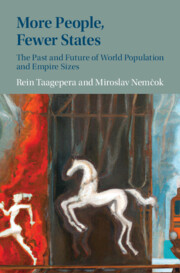
- Cited by 1
-
Cited byCrossref Citations
This Book has been cited by the following publications. This list is generated based on data provided by Crossref.
Taagepera, Rein and Nemčok, Miroslav 2024. World population growth over millennia: Ancient and present phases with a temporary halt in-between. The Anthropocene Review, Vol. 11, Issue. 1, p. 163.
- Publisher:
- Cambridge University Press
- Online publication date:
- June 2024
- Print publication year:
- 2024
- Online ISBN:
- 9781009427814
- Subjects:
- Political Sociology, Politics and International Relations, International Relations and International Organisations, Sociology


